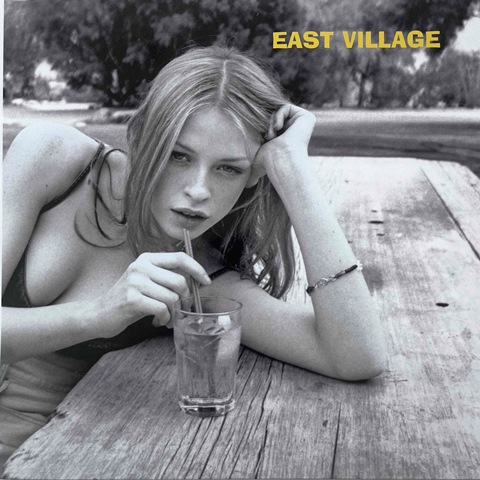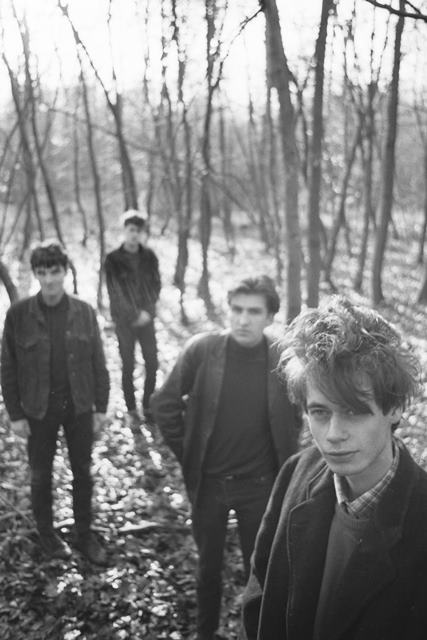The album’s opening track is titled “Silver Train.” Built around a choppy acoustic guitar refrain, it features Hammond organ, spindly electric guitar lines, pattering percussion and has a vibe – with a gospel edge – suggesting a familiarity with Let It Bleed- and Sticky Fingers-era Rolling Stones. Or, in a different time, the Primal Scream of “Movin’ On Up.”
However, East Village recorded their sole album Drop Out in January 1990 and the Primal Scream single came out in January 1992. And, compounding the chronological issues, Drop Out was initially shelved and issued in early 1993. East Village had split in March 1991 after what became their final show. Active on the indie scene since late 1987, they released just two 12-inch EPs when they were going, both in 1988: Back Between Places and Cubans In The Bluefields.
 There’s a wheels-within-wheels air about East Village. Their two EPs were released by Sub Aqua, a label run by Creation Records’ press officer Jeff Barrett. Primal Scream were on Creation. Drop Out was issued by Heavenly Recordings, a label run by Barrett and former East Village member Martin Kelly. The sessions at which Drop Out was recorded were paid for by Bob Stanley of Saint Etienne – whose first record came out on Heavenly in 1990. Martin’s brother Paul, who was also in East Village, is a regular (multi-disciplinary) collaborator with Saint Etienne.
There’s a wheels-within-wheels air about East Village. Their two EPs were released by Sub Aqua, a label run by Creation Records’ press officer Jeff Barrett. Primal Scream were on Creation. Drop Out was issued by Heavenly Recordings, a label run by Barrett and former East Village member Martin Kelly. The sessions at which Drop Out was recorded were paid for by Bob Stanley of Saint Etienne – whose first record came out on Heavenly in 1990. Martin’s brother Paul, who was also in East Village, is a regular (multi-disciplinary) collaborator with Saint Etienne.
This unavoidable web of connectivity gives a context to East Village but it obscures what truly made the Buckinghamshire quartet stand out. After “Silver Train,” Drop Out beds in with “Shipwrecked” and “Here it Comes,” a pair of adroit, lovely and melancholy songs sharing a minor-key mood with Gene Clark’s 1971 album White Light. This isn’t folk rock but is aesthetically akin to the more fully formed and earliest aspects of Los Angeles Paisley Underground stalwarts The Rain Parade at their best: a plundering of the past to create a music for the present. As Drop Out continues, it is clear this ten-track album is one of finest spawned by the UK’s independent music scene of the early Nineties. No wonder original 1993 pressings fetch £100 to £150. Its reappearance (on Heavenly – including an insert with an elegant essay by Jon Savage) is welcome.
 Although East Village emerged shortly after the period NME’s C86 cassette (in-part) defined a form of jangly indie-pop, Martin Kelly (bass/vocals), Paul Kelly (guitar/vocals), Spencer Smith (drums; he also went to play with Saint Etienne) and John Wood (guitar/vocals) were in thrall to a self-defined continuum of musical classicism – embracing the mainstream – which meant they stood apart from their contemporaries.
Although East Village emerged shortly after the period NME’s C86 cassette (in-part) defined a form of jangly indie-pop, Martin Kelly (bass/vocals), Paul Kelly (guitar/vocals), Spencer Smith (drums; he also went to play with Saint Etienne) and John Wood (guitar/vocals) were in thrall to a self-defined continuum of musical classicism – embracing the mainstream – which meant they stood apart from their contemporaries.
Their name was taken from an area of Manhattan, and they drew inspiration from Bob Dylan and, indeed, the Stones. Former Byrds member Gene Clark was openly in there too. As were dashes of UK Sixties freakbeat. Also at play when they recorded their album was the effect of having heard a test-pressing of the as-yet unissued Stones Roses debut album. They took it as a sign widespread acknowledgment was possible. However, during what became their final live show they mutually realised the spark driving them had dimmed. They could push no further – especially as they were at odds with the looming acid/rave/indie crossover. In effect, East Village were extinguished by a burgeoning aspect of the scene they were party to.
But times move on. As do people. So the unreleased album was mixed in January 1993 and then released. At this point, indie flavours of the day had also moved on – raising the question of East Village’s impact. Did they influence the post-Screamadelica Primal Scream? Given the connections, an affirmative response is not unreasonable. Whatever the answer though, Drop Out remains an impressive testament to a band which did not build on what it had to hand.
- Next week: South-African jazz from 1976 – Mike Makhalemele & Winston Mankunku Ngozi's The Bull And The Lion
- More reissue reviews on theartsdesk
- Kieron Tyler’s website















Add comment